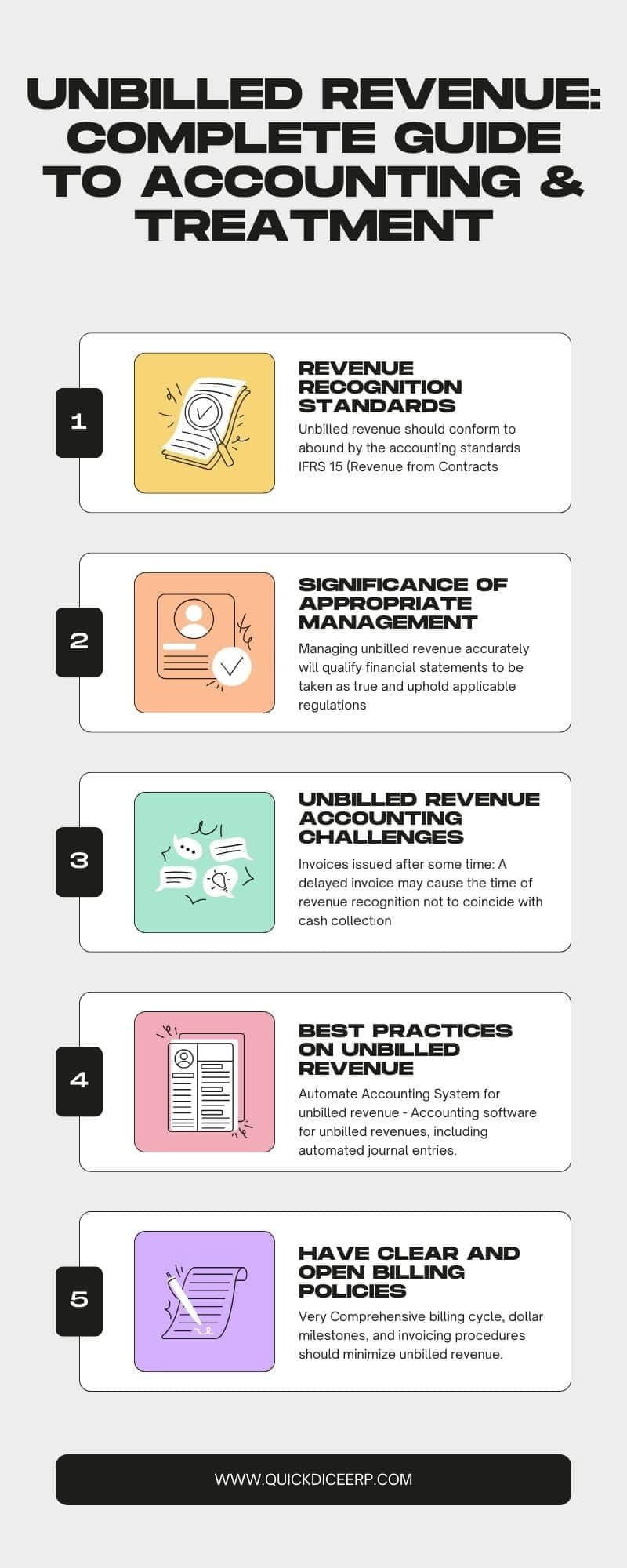Unbilled Revenue: Complete Guide to Accounting & Treatment
 Aya Basha
03 Mar, 2025
8 mins read
50
Aya Basha
03 Mar, 2025
8 mins read
50

Unbilled revenue is an essential part of financial accounting, especially for the companies rendering continuous services or working on long-term projects. Unbilled revenue is that revenue, which is earned but not yet billed to the customer at the date of reporting. This revenue is characteristic of services such as construction, software development, and consulting, where work is done over time. Accounting all unbilled revenue gives accurate financial statements in line with international accounting standards.
For the organizations in Saudi Arabia, an effective management of unbilled revenue needs sound accounting practices. Best ERP system in Saudi Arabia will help streamline financial tracking, automate revenue recognition, and check discrepancies in billing. When no efficient system in place, a company faces a risk of misstatements, cash flow problems, and violations. Hence, one should learn how to account for unbilled revenue and its treatment in order to enjoy the glitter of transparency and financial health.
Here are some of the unbilled revenues: Complete Guide to Accounting & Treatment

Unbilled revenue is recognized when a good and service has been provided to a customer but no invoice has yet been tendered. For the most part, this situation arises in industries that have projects spanning several accounting periods, or if contracts stipulate periodic billings. Since this amount will be received by the company sometime in the future, it will be classified as an asset in the balance sheet.
In a practical example, a software development company that had a six-month implementation period was working simultaneously for three months on the project. No invoice has been issued to the client, yet the company recognized the revenue earned so far as unbilled revenue. Such an approach confirms that the financial statements will reveal the true performance of the company involving revenue generation.
Revenue Recognition Standards

Unbilled revenue should conform to abound by the accounting standards IFRS 15 (Revenue from Contracts with Customers) and ASC 606 (Revenue Recognition).
Under these standards, revenue is recognized when the performance obligation is satisfied, irrespective of the date of invoice.
Significance of Appropriate Management of Unbilled Revenue

Managing unbilled revenue accurately will qualify financial statements to be taken as true and uphold applicable regulations. Some of the underlying advantages are:
- Financial Transparency: Truly reflects the revenue and financial health of the company.
- Regulatory Compliance: Follows due principles of accounting and standards for revenue recognition.
- Cash Flow Management Improvement: Aids businesses in determining future cash inflows and planning for them.
- Investor and Stakeholder Trust: Poses a transparent representation of the operating performance of a company.
Unbilled Revenue Accounting Challenges

There are several challenges in the management of unbilled revenue:
- Invoices issued after some time: A delayed invoice may cause the time of revenue recognition not to coincide with cash collection.
- Mistaking Revenue Recognition: Entries made incorrectly expose inaccurate financial statements and become a threat to compliance.
- Cash Flow Challenges: Unbilled revenues may be an impediment to liquidity or cash flow if they are not collected for a long time.
- Audit & Compliance Risk: Failure to carry out would invariably attract auditor scrutiny and confrontation from regulatory bodies.
Best Practices on Unbilled Revenue
The following are best practices that should be adopted by businesses in accounting and managing unbilled revenues:
Automate Accounting System for unbilled revenue - Accounting software for unbilled revenues, including automated journal entries.
Have Clear and Open Billing Policies - Very Comprehensive billing cycle, dollar milestones, and invoicing procedures should minimize unbilled revenue.
Regular Reconciliation - At least once a month: Determine unbilled income according to contract terms and actual work done.
Tips and Tricks for Handling Unbilled Revenues
Unbilled revenue requires sound accounting and proper management. To achieve this, for these businesses, following the best practices is suggested:
Automated Accounting: Accounting programs should track accrued unbilled revenue and automate any necessary journal entries.
Clear Billing Policy: The companies should define their own billing cycles, milestones, and invoice procedures to keep the overheads of unbilled revenue to a minimum.
Regular Reconciliation: These unbilled revenues should then be reconciled on a periodic basis, ensuring that the supporting documents correspond with the contractual obligations and actual work done.
Monitoring Aged Unbilled Revenue: Tracking unbilled revenue that has remained unbilled for too long and discussing the issue is advisable.
Better Communication with Clients: Likewise, customers must be made aware of billing schedules and payment terms.
Conclusion:
Accurate accounting and appropriate treatment of unbilled revenues are important factors contributing to a company's financial stability. All businesses should be able to recognize unbilled revenue based on percentage of completion or based on time-lapse incurred following international accounting standards like IFRS and GAAP. Implementation of best ERP system in Saudi Arabia gives capability to the firms to automate revenue computations, keep track of unbilled amounts and produce accurate reports.
Failure to manage unbilled revenue rightly can result in financial inaccuracies, which typically affect business decisions and regulatory compliance. Businesses in Saudi Arabia can thus leverage advanced ERP solutions to improve their accounting processes while ensuring financial integrity and enhancing overall operational efficiencies. Proper management of unbilled revenues, therefore, enhances cash flows and at the same time improves long-term business growth and financial credibility.
Written By:
Aya Basha



Hotels at your convenience
Now choose your stay according to your preference. From finding a place for your dream destination or a mere weekend getaway to business accommodations or brief stay, we have got you covered. Explore hotels as per your mood.





